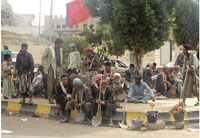
Workers seek protection [Archives:2007/1067/Reportage]
July 12 2007
 |
and Bushra Al-Ansi
For Yemen Times
Abdu Ali, a construction worker, waits patiently early every morning in the same spot for his employer to transport him to work. Six years ago, Abdu, along with his family, left his village for the capital city of Sana'a in the hopes of finding an abundance of work to improve his living standards. His particular skill led him to seek employment opportunities in construction, however, reality proved meek as Abdu found that jobs in his field were scarce. Working only twelve days in a month and earning a total sum of YR 18000, by the time he pays YR 9000 for the rent of his room in Sana'a and sends some money home for his family, little is left for everyday personal expenditures.
Abdu's example is reflective of the circumstances of hundreds of workers in Yemen, those who also work in construction as well as in other trades such as painting, ceramics, and shipment. Workers in these types of trade, categorized as “unorganized labor,” are concentrated in certain areas of the capital city of Sana'a. These concentrated locations are well-known by employers, who come and take the workers after negotiating wages. Contractors, in turn, deceive the workers in order to take some of their daily wages. The workers do not have any labor union to protect them and their rights.
One of the trade workers with whom the Yemen Times was able to meet is a high secondary school graduate. He has been fixing floor tiles and ceramics since the age of three. He commented that most of the employers in the trades mentioned above exploit their workers by not giving them the full amount of agreed upon wages. The workers are not able to sue the employers due to lack of a written contract between the two parties. Moreover, their daily wages do not enable them to hire a lawyer to defend them.
However, the exploitation of this category of workers is not only in wage appropriations but extends to the negligence of their rights due to injuries obtained while working. Injuries sustained may be so critical that they cause a serious disability. A painter told the Yemen Times that he has worked in his field for 21 years. One day he fell down from the scaffold and broke his leg. Instead of treating him, the contractor dispensed of him.
This daily laborer lacks legal protection of their rights. They also suffer from the unavailability of labor unions to protect them and defend them against violations that they are subjected to by the contractors and employers.
However, Mohammed Al-Hadi, Secretary of the Labor Reconciliation Department in the General Union of Laborers, said, “This category of workers deserves care and attention though some of them belong to the Union of Construction and Developments. But the level of union regulation is humble.” He also added that workers report to the Labor Reconciliation Department in the Ministry of Social Affairs and Labor when disputes take place between workers and their employers. In turn, the Labor Reconciliation Department mediates and finds suitable solutions according to the law. If the case is not resolved in the department, they are referred to the judgment committee. This committee does not distinguish between a worker in the private or public sector. The verdicts of this committee are judicial, Al-Hadi asserted.
Mohammed Al-Jadri, Head of the General Union of Laborers, confirmed that unorganized workers have no legal protection and do not belong to recognized companies or estblishments. Workers only make daily wages. He also pointed out that this category of workers lack social protection since there is no law to protect their rights. The union is investigating their situation in order to issue a law to protect them and connect them to the establishment of social insurance, Al-Jadri elaborated.
According to Dr. Ali Mohammed Ahmed, Deputy of the Ministry of Social Affairs, unorganized labor, or the so-called “unorganized economy,” contribute 30-40 percent of total local production. This high proportion warrants intervention. Workers in this category are employed in various sectors including agriculture, industry and construction.
Dr. Ali also pointed out that Labor Law No. 5, enacted in 1995, protects the rights of laborers, including their safety wages and work leave. This law, however, does not include unorganized labor. By the end of the current month, the situation of this sector will be discussed in light of the amendment of the Labor Law, the Deputy stated, adding that there are already a number of suggestions related to assisting the unorganized sector. Suggestions include the establishment of unions and associations for unorganized laborers as well as support and rehabilitation channels.
Future promises abound, however two questions still remain: Will the Labor Law be amended in favor of unorganized workers? Or are the promises of the Ministry of Social Affairs and the Labor Union merely lip service? Time will tell.
——
[archive-e:1067-v:15-y:2007-d:2007-07-12-p:report]


